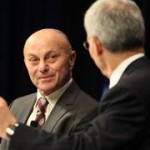Bonus: Should retirees limit their spending to the interest and dividends they receive? Ken French says investors should be indifferent to how they raise cash, whether through dividends and interest, or through the sale of shares–a method Merton Miller called “homemade dividends.” Despite the economic logic, some investors focus on dividends and interest. While this approach may encourage disciplined spending, Ken explains that it also can distort one’s investment approach–for example, when investors choose dividend-paying stocks over broad diversification, or chase higher yields by holding riskier bonds. In an effort to get more, they actually lose.
Our Role As Your Independent Investment Advisor & Coach
Our Role As Your Independent Investment Advisor & Coach
- Educate by imparting knowledge on markets and the basic principles of investing
- Provide the best solutions for your financial needs
- Evaluate and analyze your risk tolerance and financial needs
- Create a custom financial and investment plan just for you
- Monitor and help you manage your expectations and keep you on track to meet your personal goals
- Develop investment portfolios based upon science and academic research
- Manage risk through globally diversified portfolios to manage risk and capture performance of the world’s markets
Efficient Market Theory In A Nutshell
The only one who is smarter than anybody is everybody.
Markets reflect the vast, complex network of information, expectations, and human behavior. These forces drive prices to fair value. This simple yet powerful view of market equilibrium has profound investment implications. No one individual or firm knows more than the collective wisdom of 7 billion people.
A great way to test this theory is to see the amount of active mutual fund managers that have been able to beat their respective benchmarks. Their performance have been dismal, in fact no more than random chance alone and statistically insignificant.
A fundamental component of Free Market Investing is the Efficient Market Hypothesis, first explained by Eugene F. Fama in his 1965 doctoral thesis:
“An efficient market is defined as a market where there are large numbers of rational, profit-maximizers actively competing, with each trying to predict future market values of individual securities, and where important current information is almost freely available to all participants. In an efficient market, competition among the many intelligent participants leads to a situation where, at any point in time, actual prices of individual securities already reflect the effects of information based both on events that have already occurred and on events which, as of now, the market expects to take place in the future. In other words, in an efficient market at any point in time the actual price of a security will be a good estimate of its intrinsic value.” Eugene F. Fama, “Random Walks in Stock Market Prices,” Financial Analysts Journal, September/October 1965.
Professor Eugene Fama – Why Do Small Caps And Value Stocks Outperform

Eugene Fama, Robert R. McCormick Distinguished Service Professor of Finance, May 24, 2012.
Starting in the 1960’s, market volatility was seen to be the sole driver of asset pricing, as expressed in the Capital Asset Pricing Model known as CAPM. In 1992, this award-winning academic co-authored a paper which identified two other variables that drive asset class returns.
Do You Make These Mistakes When Investing & Planning For Retirement? This workshop will inspire you to change the way you save and invest through compelling evidence and insightful analysis of today’s challenging financial landscape.
Economics 101: Learning From Sweden’s Free Market Renaissance
Sweden is a powerful example of the importance of public policy. The Nordic nation became rich between 1870 and 1970 when government was very small, but then began to stagnate as welfare state policies were implemented in the 1970s and 1980s. The CF&P Foundation video explains that Sweden is now shifting back to economic freedom in hopes of undoing the damage caused by an excessive welfare state.
Power of Free Markets by Milton Friedman: The Pencil
The power of free markets by Milton Friedman. He was a recipient of the Nobel Memorial Prize in Economic Sciences.